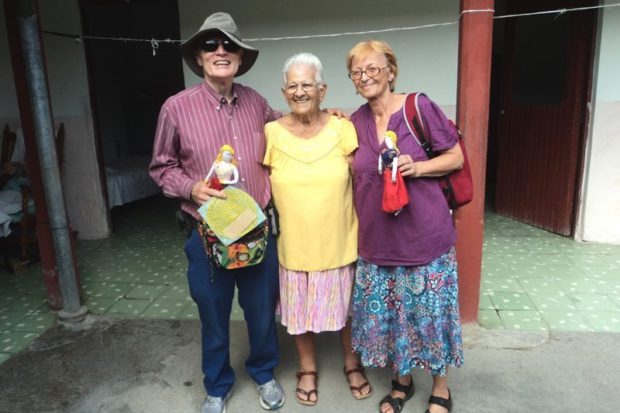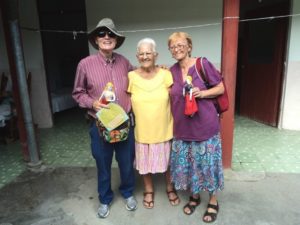
By Gerry Bill

Cuba does many of the things that other countries do, but somehow it manages to do them just a bit differently and, in many cases, a bit better. Even though this was my seventh trip to the island nation with Pastors for Peace, I still learned new and exciting things about our neighbor to the south.
Traveling with Pastors for Peace is not at all like being a tourist in Cuba. We go to places that tourists would not know how to find and probably couldn’t be bothered to find. I want to tell you about a visit to a home for elderly women, a visit to an animal shelter and a visit to the National Center for Sex Education.
Hogar de Ancianas
One place tourists never go is the Hogar de Ancianas (home for elderly women) in the city of Santa Clara, province of Villa Clara. This place was full of surprises. It was not at all what I was expecting. From the outside, it doesn’t look like much—just a small doorway in a row of buildings on a side street marked by a barely noticeable sign. Inside, however, is a different story. After going through an entry hall, it opens up into a bright and airy courtyard where the residents spend a good bit of their time. The courtyard had the feel of being the center of all the action for these elders.
It is a bit unusual in Cuba for a home for the elderly to be for women only, but this one is. Perhaps that affects the character of the place in a positive way. Anyway, for whatever reason, the women there were in high spirits and quite active. I believe they were all 80 and older, but many of them acted much younger. One of the high points of our visit was when one of the women, 91 years old, sang a couple of songs for us. Because of her age, I was expecting her voice might crack a bit, but nothing of the sort happened. She could have been an opera star even now.
The women showed off their crafts to us. One woman gave me a doll she had made. We got to see their rooms, which were smallish but neat, clean and nicely decorated. They all seemed quite happy to have the visitors and proud to show off their place of residence.
I have been in fancier homes for the elderly in the United States, but never one with this nice a feel to it. I imagine the staff has something to do with that. There are 33 staff people for the 35 residents, and the ones we met were quite pleasant and upbeat about their work. There was no sense that they were being overworked and underpaid, which is the sense I get when visiting similar facilities in the United States. This fits with what I have learned about Cuba over the years. While they often lack some of the physical resources that we have at home, they are rich in human resources and they put that to good advantage.
A Visit to the Animal Shelter
How many tourists in Havana seek out the animal shelter? A small group of us from the Pastors for Peace caravan did just that. It is on a quiet side street not far from the old, colonial Havana, in a converted house. When we arrived, we were greeted by two young women and a young man who were running the place. They were caring for around 30 stray dogs.
I have visited animal shelters in the United States, and I always find them a bit depressing, but not so in Havana. Instead of the dogs being kept in small, individual cages, they were free to run around the place at will. It was not at all like visiting an institution. It was more like visiting a family that just happened to have a lot of dogs. In the kitchen, the young man was preparing a meal for the dogs in a large stew pot. No canned food, no kibbles, this was to be a real, home-cooked meal for the 30 canine guests.
The medical needs of the dogs are all looked after by some volunteer veterinarians who come in on certain weekdays. The dogs all get their shots, they get spayed and neutered, and they get bathed and groomed. The dogs seem to all get on well with one another and are happy to have so many playmates. They also liked to have visitors, and whenever one of us sat down for a minute there would soon be a lap dog taking advantage of the newly created lap.
I have never seen such a happy group of dogs in a U.S. shelter. Of course, this shelter does not euthanize the animals, so there were no dogs facing a death sentence. I don’t know if the dogs knew that, but the people who ran the place knew it, and their positive attitude seemed to rub off on the animals. All in all, it was a happy place to visit.
A Visit to the National Center for Sex Education
Another non-tourist hotspot we visited in Havana was Centro Nacional de Educación Sexual, or CENESEX. In the 1970s, this agency got its start by working on women’s reproductive health issues, but it has since become the prime organization advocating for LGBT rights in Cuba.
Cubans have not always had a positive attitude toward non-heterosexuals. In fact, during the Soviet era there was quite a bit of repression of gays and lesbians. Perhaps that was partly the influence of the Russians. Anyway, Cuba has done an about-face on these issues and is in some ways more progressive than the United States. For example, transgendered people can get free sex reassignment surgery, all paid for by the government. I don’t remember seeing a plank like that in the Republican or Democratic platforms.
Sex work in Cuba is not called prostitution by CENESEX; it is called transactional sex, which has far fewer negative connotations. They have specially trained health workers who work with this group, some of them former sex workers themselves. This makes it into a form of peer-to-peer counseling.
CENESEX also has a special program to train police in how to respectfully deal with transvestites. The program is credited with greatly reducing police violence against this group. All of this is being paid for by the Cuban government, which has adopted the position that sexual rights are human rights.
Not all Cubans are on board with their government in promoting full rights for people they see as outside the norm. As one of the CENESEX speakers said, “Cuba is a macho and homophobic society.” Despite that, he said, the center’s educational efforts are helping quite a bit, and societal attitudes are definitely changing.
Who says Cuba can’t change?
*****
Gerry Bill is emeritus professor of sociology and American studies at Fresno City College. He travels to Cuba with the Pastors for Peace humanitarian aid caravan every year, most recently in July 2012.
